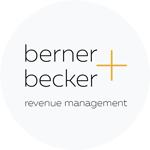Take back control of your inventory. Part 1 of 3 – Agency Fair Groups
Almost all hotels we have worked with throughout our careers have had an issue with taking in too much committed business during high demand periods. For most cases this has led to a huge loss of profitable revenue through missed ADR opportunities and for pretty much all of these hotels we were able to significantly increase revenues after taking over, simply by shifting early committed business to more flexible public business.
Even though it seems obvious we encounter the same issue over and over again for all types of hotels throughout Europe, whether it’s chain or independent, large or small properties. Interestingly enough this topic gets very little attention, especially compared to the ever ongoing distribution debate of Online Travel Agencies (OTAs) vs direct business. Therefore, we have decided to cover it in a small series. This is the first piece of three.
Meaning of committed business
So what exactly do we mean when talking about committed business? Committed business is room inventory that you give away to a third party to use and that you have no control over of how it is being sold anymore. Typically, these are allotments given to wholesalers and tour operators, last room availability (LRA) corporate contracts, and group blocks given away to business group resellers such as professional congress organizers (PCOs) and event agencies during high demand periods and fairs.
While each of the above examples have their own pros and cons and depending on your destination need to be carefully monitored, we want to focus this article on the most “extreme money burner”; the blocked inventory through business group resellers during fairs. We will cover the committed LRA corporate business and wholesaler allotments in another piece within the coming months.
Committed business during fairs
For many business destinations large trade fairs represent the biggest opportunity to make considerable profits during a year. To the big A-fairs often the entire destination sells out and hoteliers can charge almost any price for their rooms if they still have them available a few weeks before the fair starts.
Too often we see that hotels don’t have enough rooms available for sale anymore when the peak rates can be charged, as they have committed a large portion of their inventory to agencies and PCOs for them to sell the rooms.
By giving away too much inventory to resellers, hoteliers often sell out months, even years in advance, giving the resellers the ability to make the big money on commissions and/or mark-ups, while hoteliers are only getting the negotiated rates. Why would you want someone else take the credit during one of the few times you could really make some serious money?
There are two types of agency requests you can receive, the better ones already have an end client confirmed that needs rooms in your destination and is likely to actually bring you business, the worse ones don’t have any end client confirmed and simply block your rooms trying to sell them in the future. The latter ones you should be very careful of.
As always the story isn’t black and white and there are both pros and cons of working with fair group resellers, for some hotels it might actually make sense to work with them within reasonable limits (so don’t kick out all your agencies to fairs just yet), but before working with them you have to consider the following points.
Main disadvantages of working with fair group resellers
- Timing: Generally, agencies request the rooms very early, often years in advance. While this might be nice for base business and security, it is not if you give all rooms away in advance, as you cannot react to changes in the market anymore.
- Cancellation policies: Most agencies are good negotiators or use standard contracts that allow them to cancel all or a large portion of the rooms on relatively short notice (this varies largely from destination to destination, but I have seen 3 months’ cancellation policies for entire groups at large fair destinations). You might have to decline several request as you believe you are full, only to see the agency releasing their unsold inventory again shortly before the event. This leaves your success completely in the hand of the agency and its ability to resell your hotel.
- Prices: The good negotiation also holds true for room rates. With most agencies it is difficult to achieve high rate increases from one year to another. Again you commit yourself to a price early on, unable to react to market changes. For sure those negotiated rates are below the transient rates you can achieve once your destination is selling out.
- Shoulder nights: This point depends a lot on yourself, if you allow groups in your hotel for the peak nights only and if you work with strict minimum length of stay controls in the contract. If not, you might see the agency block rooms for the entire event, but only sell the main days, returning the others back to you within their cancellation policy. This is probably the worst situation of all, because it will destroy your straight line availability and it will almost be impossible to sell your shoulder nights to good rates without having availability on the peak nights anymore.
Real-life example
A few years ago I took over the revenue responsibility for a 200+ room business hotel in a large European city right next to a congress centre. The city sees a lot of medical congresses that change its destination year-on-year and are therefore difficult to judge in terms of impact, as there is no past data available for the event. PCOs usually request rooms for the event 2-3 years in advance. In the past the previous revenue manager always gave the PCO almost the entire hotel inventory to sell at the same rate for all fairs, regardless of demand. On top the groups had a cancellation policy of only 3 months for the entire inventory blocked. Here is what happened:
- For all congresses that turned out to have a high impact on the entire city, the PCOs sold all blocked rooms and we were full. At the same time, we had to watch our competitors with much worse locations to the congress centre sell much higher rates for the event than we had agreed on with our PCO, because they had not committed all their inventory and could react to the high demand. In turn our market share, due to a low ARI, was a disaster during these congresses and we let a lot of profitable revenues go by.
- For all congresses that turned out to have a lower impact, the PCOs hardly managed to sell any rooms and gave us back our inventory 3 months prior to the congress, with not enough time left for us to sell all our rooms publicly to good rates for a medium impacted congress. In the months running up to the congress we had previously declined several promising requests from actual clients. Because our inventory was still sitting with the PCO and we believed we had a full hotel, we couldn’t offer those and they hence went to the competition. The result was again a low market share due to insufficient Occupancy to too low rates.
No matter how strong the demand for each congress turned out to be, for all scenarios the hotel would have been much better off if it hadn’t committed the rooms to a PCO, but sold them to the right prices to actual clients wanting to stay at the hotel, through a mix of direct groups and public transient rates.
The above is an extreme example and probably most hotels would act smarter on how they deal with PCOs, but it did really happen like this and as these contracts were given years in advance for every congress to come, it took me almost two years to clean this up and finally have inventory available during fairs to sell at the right prices.
I could continue to give countless examples of top A-fairs, huge congresses, high impact sporting events such as Champions League finals, high demand public holidays such as New Year’s Eve, etc. to which large amount of rooms were given away to resellers, that could otherwise have been sold a lot more expensive publicly had the inventory been available.
Our advice
We often hear that fairs are running well and are not the issue, because “they are already completely sold for next year”. Latest at this moment we realize that fair performance is a big issue in that property, because a hotel that has its entire inventory sold way ahead of a fair is usually missing out on the biggest revenue opportunities.
Historically PCOs were a needed distribution vehicle, but in today’s distribution climate your hotel can be found via other channels. It takes a little bit of courage to say no to fair resellers and sell your inventory yourself, but with the right amount of data backing your decision, it shouldn’t be a problem. Usually a good place to start is by looking at the market share data for the last time an event happened. If the competition had an overall occupancy level in the high 90s and higher rates than yourself, you know you need to be more brave in the future. If you don’t have a much worse location towards the fairgrounds than your competitors, you should aim to have your highest RGIs during the big fairs, because that is the time when you can really outplay your competitors with good revenue management!
It obviously depends on the size and location of your hotel, but as a general point we would advise to never offer more than half of your inventory to resellers during a strong event and never offer more than 25% to a single reseller. If you have group business directly from the end client it’s a different story, but even then try to keep at least 25% – 30% of your inventory for those high priced last minute bookings.
Don’t forget, you don’t only get fair-bookings during fairs, the regular business doesn’t stop, so even if the fair itself is sold mostly via groups, there will still be transient business travellers that will pay you high prices to stay at your hotel (given the fact that you have set your corporate close out correct, but that’s another story).
Now we are not saying to go ahead and kick out all of your agency business to fairs and never accept a new one coming in. But be critical, think about the needs of your hotel given its location and size, challenge your previously reached numbers, look at your denials, set your goals high and aim to outperform your competition to high impact events. In most cases you will be much better off with less committed business from agency groups to your events.




